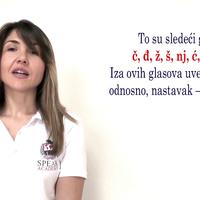Lesson 6.1 Serbian language - Parts of the body and the plural of the nouns
|||Части|||тело|||множественное число|||существительные
Lesson||language|parts|of|the|body|and||plural|the nouns|the|nouns
Lektion 6.1 Serbische Sprache – Körperteile und der Plural der Substantive
Μάθημα 6.1 Σερβική γλώσσα - Μέρη του σώματος και ο πληθυντικός των ουσιαστικών
Lesson 6.1 Serbian language - Parts of the body and the plural of the nouns
Lección 6.1 Lengua serbia - Partes del cuerpo y plural de los sustantivos
Leçon 6.1 Langue serbe - Parties du corps et pluriel des noms
Урок 6.1 Сербский язык - Части тела и множественное число существительных
Ders 6.1 Sırp dili - Vücudun bölümleri ve isimlerin çoğulu
Урок 6.1 Сербська мова - Частини тіла та множина іменників
课 6.1 塞尔维亚语 - 身体各部分和名词复数
Delovi tela i množina imenica
|||множественное число|
parts|body|and|plural|nouns
Parts of the body and plural of nouns
glava
head (1)
head
glave
glave
heads
kosa
hair (1)
kose
hair (1)
hair
uho
uh-oh
ear
uši
ears
ears
oko
eye (1)
oči
eyes
nos
to us
nosevi
we knew
usta
mouth
mouth
usna
губа
to smell
lip
usne
it used
lips
čelo
лоб
forehead
forehead
čela
чела
foreheads
obrva
бровь
eyebrow
eyebrow
obrve
eyebrows
eyebrows
brada
beard
chin
brade
braid
beard
obraz
образ
image
cheek
obrazi
to shape
cheeks
vrat
вернусь
to return
neck
vratovi
necks
necks
rame
рама
copper
shoulder
ramena
плечи
shoulders
ruka
hand
arm
ruke
hands (1)
arms
šaka
кулак
hand
fist
šake
руки
hands
fists
stomak
stomach
stomach
stomaci
животы
stomach
noga
the leg
noge
koleno
knee
knee
kolena
knees
knees
stopalo
нога
stop it
foot
stopala
стопа
stop it
Većina imenica u srpskom jeziku množinu gradi dodavanjem nastavaka:
|||||множеству||добавлением|
|nouns||||plural|forms|adding|suffixes
Most nouns in the Serbian language form the plural by adding endings:
Za muški rod nastavak je -i
|masculine|gender|||
For masculine gender, the ending is -i
oči
eyes
eyes
uši
ears
ears
nosevi
noses
obrazi
forms
vratovi
necks (1)
stomaci
stomach (1)
U primerima oči, uši, stomaci došlo je do glasovnih promena zbog lakšeg izgovora
|||||пришло||||изменения||легкого|произношения
|the examples|eyes|||it has happened|||vocal|changes||easier|pronunciation
In examples like eyes, ears, and stomachs, there have been phonetic changes for easier pronunciation.
Za sada samo učimo gotove reči
||||готовые|
||||ready|
For now, we are only learning ready-made words.
U jednosložnim rečima kao što su nos i vrat, osnova se proširuje umetanjem -ov ili -ev
|односоставным||||||||||расширяется|вставкой|-ов||ев
|one-syllable|||||||neck|base||expands|inserting|of||his
In monosyllabic words such as nose and neck, the base is expanded by inserting -ov or -ev.
grad
gradovi
kraj
конец
krajevi
края
regions
kralj
king
kraljevi
royal
broj
brojevi
numbers
Kada upotrebljavamo -ov a kada -ev?
|we use|possessive suffix|||
U srpskom jeziku više se ne obraća pažnja na meke glasove
||||||обращает|внимание||мягкие|звуки
||||||pays attention|attention||soft|sounds
In the Serbian language, more attention is no longer paid to soft sounds
ali u staroslovenskom jeziku svi prednjonepčani suglasnici
||старославянском|||переднеязычные|согласные
||Old Slavic|||front nasal consonants|consonants
but in the Old Slavic language, all front nasal consonants
odnosno
относительно
namely
that is
suglasnici koji su se izgovarali na prednjem nepcu
||||произносились|||небе
||||pronounced|||palate
smatrani su mekim glasovima
считались||мягкими|голосами
they are considered||soft|soft voices
To su sledeći glasovi
||следующие|
|||voices
Iza ovih glasova uvek stoji glas e , odnosno nastavak -ev
за|||||||то есть||
||of voices|||||that is|suffix|-ev suffix
Behind these voices always stands the sound e, or rather the suffix -ev
Međutim, ukoliko je u prethodnom slogu već upotrebljen glas e
однако|если|||предыдущем|||употреблён||
|if|||previous|syllable||used||
However, if the sound e has already been used in the previous syllable
onda će reč dobiti nastavak -ov
|||получить|суффикс|
||||suffix|possessive suffix
then the word will receive the suffix -ov
bez obzira na to koji suglasnik se nalazi ispred -ov
|||||||находится||
|regard||||consonant||||possessive suffix
Na primer
neće biti kejevi, već kejovi
||кеи||кеи
||keyboards||kejevi = key
Iza svih ostalih suglasnika stoji nastavak -ov
Behind|||consonants|stands|suffix|possessive suffix
Behind all other consonants stands the suffix -ov
Imenice ženskog roda u množini dobijaju nastavak -e
|||||receive||
Feminine nouns in the plural receive the suffix -e
Imenice srednjeg roda u množini dobijaju nastavak -a
|||||they receive||
Neuter nouns in the plural receive the suffix -a
Kao što vidimo i neke imenice srednjeg roda u množini proširuju svoju osnovu sa -n ili -t
||||||||||продлевают||||||
||||||||||expand||||n||
As we see, some neuter nouns in the plural extend their base with -n or -t
Pridevi se sa imenicama slažu i u broju
прилагательные|||существительными|согласуются|||
|||||||number
Adjectives agree with nouns in number
Množina imenica
Plural of nouns

